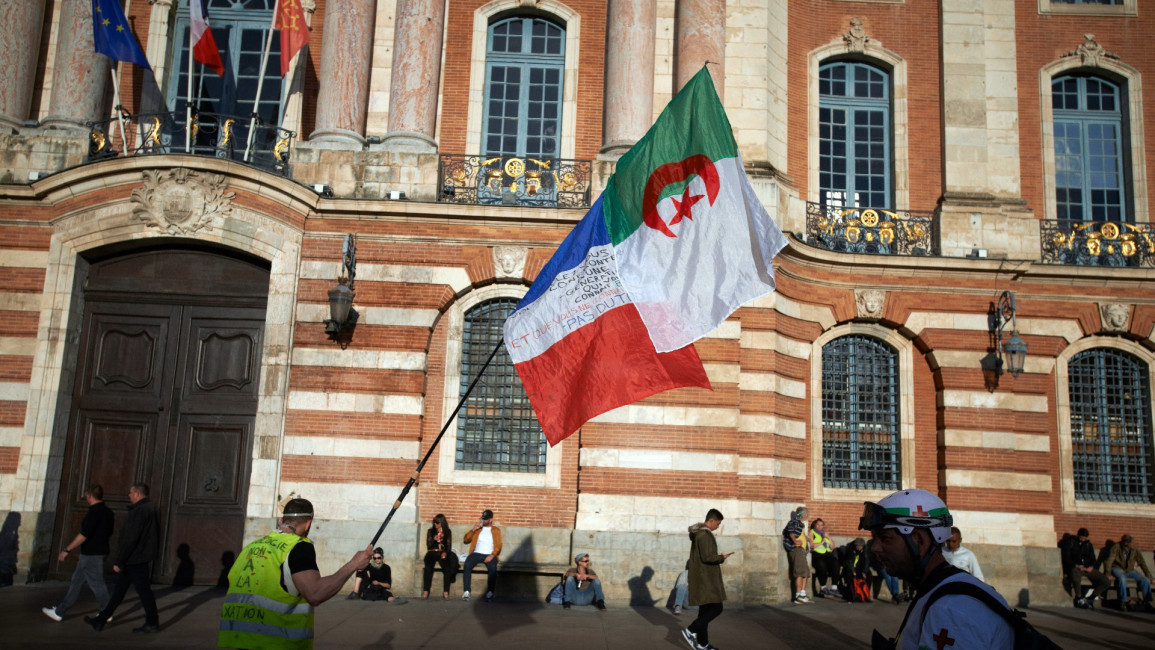
What's in a flag?
In the latest instalment of the Republic's onslaught against Muslims and North Africans in the name of so-called "anti-separatism", politicians in France are seeking to ban foreign flags from weddings.
In an amendment to the separatism bill that is making its way through the French parliament, mayors will be expected to police and reprimand weddings which aren't in line with "republican values".
While there is no explicit mention of a particular country's flag that the law intends to suppress, the Algerian flag has been mentioned numerous times by legislators. One, stated, "If Algerians are happy to be in France, let them show it with a French flag". Another, Henri Leroy said, "In France, the town hall is the symbol of our identity. It is therefore logical that only our flag flies there."
In France's continued defence of 'égalité' through supposed colour blindness, legislators claim that this bid to strengthen nationalism does not target religious or ethnic groups. However, between the increasingly aggresive anti-Muslim policies that Macron has been rolling out in the lead up to the national elections, as well as the literal admission by French politicians who support the law, it is clear the opposite is true.
 |
Legislators claim that this bid to strengthen nationalism does not target religious or ethnic groups |  |
Such a law may seem minor, given that the ban - if it passes - would only impact weddings. But policies like this are rarely confined to just one space. This is a political attack that holds the weight of a long colonial history between France and Algeria.
In fact, the Algerian flag has been the target of the French state since its inception as a symbol of resistance against the French colonisation of the country, which lasted for 132 years. On 8 May 1945, as celebrations swept across colonised Algeria for VE Day, Algerians also took to the streets of Sétif in the hope of finally obtaining their own liberation. Given that hundreds of thousands of Algerians were conscripted to the French Army in World War II, many having paid with their lives, they too had a claim to the day's processions.
Twitter Post
|
As thousands of Algerians chanted "end occupation!", French forces descended on them with arms. In the ensuing clashes, a young boy by the name of Bouzid Saâl who held a home-made Algerian flag, was shot by a policeman for refusing to put it down.
This proved to be a crucial turning point, even among those who had previously preached an assimilationist approach to the Algerian question, like Ferhat Abbas - Algeria's future acting president. Demonstrations swept many cities across the country leading to around 100 settler casualties. The French state responded with unrestrained brutality. Around 45,000 Algerians were murdered during the repression that followed.
How France's refusal to right historical wrongs marred a reconciliation project with Algeria
The flag, Bouzid's resistance and the 8 May, were written in the collective memory of the people as key symbols of the long, hard fought, and bloody struggle for independence that Algerians at home and in the diaspora commemorate to this day. In the very spot where Bouzid was shot in Sétif, there now stands a large memorial statue of the young martyr and his flag is preserved in the national Mujaheed Museum.
And so, the latest attempt by French politicians to repress the Algerian flag has only reignited a rage that is longstanding. It is a reminder of the contempt in which the Republic holds the descendants of its colonies and its continued refusal to recognise its historic crimes. This bill sends yet another message to North Africans in France: you are here to work for little, carry out the jobs no-one else wants to do. At most, you can entertain as an athlete or musician, but for the rest; shut up and stay at home.
Nowhere is this stark reality as striking, as in the world of football and public celebrations. Algerian players - none more celebrated than Zinedine Zidane - are hailed as heroes, as long as they serve under the tricolore.
The press, politicians, and the public celebrated the "black, white, Arab" team that delivered France the world cup in 1998 in Paris. No public reflections on the historical roots of why a French team was so "black and Arab" took place.
 |
Algerians have long understood the significance of maintaining ties to their revolutionary history |  |
A few years later, when it was Algeria's turn to qualify for the World Cup and Algerians in France celebrated in the streets, they were condemned as traitors to the nation.
The symbolic role that the Algerian flag holds remains strong. When the Hirak movement burst on to the streets of Algeria in 2019 in opposition to then President Abdel-Aziz Bouteflika's bid for a fifth term, you were more likely to see flags - Palestinian as well as Algerian - than people. Algerians have long understood the significance of maintaining ties to their revolutionary history, and that of others. The Palestinian flag is a very common presence in the Hirak protests, because it signifies the continued solidarity that the people must extend to the oppressed. Flying the Palestinian flag alongside the Algerian one sends a message to all occupiers, tyrants and repressive regimes that resistance will never be defeated.
 |
It stands for France's defeat and for resistance to our ongoing injustices, at home and abroad |  |
Two years on, as the people continue to march against the military regime, the flag flies proudly in the hands of children, students, artists, women, workers, and the elderly. The desire to reclaim it from the military men in power, and take back a crucial aspect of the people's anti-colonial struggle and its radical history, is a powerful aspect of the movement.
It stands for freedom against the people's oppressors: colonial and domestic, historic and present. The French right wing has good reason to hate it. It stands for their defeat and for resistance to their ongoing injustices, at home and abroad. At every wedding it flies, because the people remind themselves - and those who would send them back across the water - that they are here to stay, but on their own terms. Undefeated. And proud.
Malia Bouattia is an activist, a former president of the National Union of Students, and co-founder of the Students not Suspects/Educators not Informants Network.
Follow her on Twitter: @MaliaBouattia
Have questions or comments? Email us at: editorial-english@alaraby.co.uk
Opinions expressed here are the author's own, and do not necessarily reflect those of her employer, or of The New Arab and its editorial board or staff.




